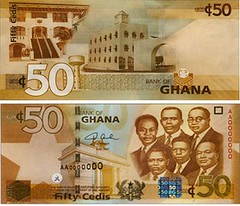ACCRA, Ghana — The planned obsolescence of sub-Saharan Africa’s worst currency, the Ghanaian cedi, has fortunately begun. It received a much-need facelift this month — all bills were redenominated — that is hard to dislike.
Receding into memory, albeit slowly, are limited-value bills that peaked at 10,000 ($1.11 approximately) and 20,000 ($2.22), transforming basic transactions into careful counting exercises.
A month’s rent valued at $550 became 4,950,000 cedi; now consider the size of that pile when the landlord, as they are wont to do here, demands six months (29,700,000) to a year (59,400,000) upfront.
A reliable used car such as an Opal might cost 45,000,000, but a newer Japanese sedan might start at 100,000,000 or more.
“Too many bills,” lamented John Boadu, an official in the governing National Patriotic Party.
No one dare disagree after receiving a brick of 5,000,000 ($555), consisting of 500 bills each worth 10,000 cedi. Placing that brick into a manila envelope, handed out by banks, then tucked into a bag, hardly instills a sense of security.
Indeed, in this cash-dominated society, the threat of theft often seemed heightened because of the overabundance of bills people were forced to carry as cedi millionaires.
Slashing four zeroes from the cedi, then, is an inspired move by the Ghanaian government. No longer is the biggest bill worth $2.22, but $22.22 (20 new cedi). ATMs even allow a person itching to spend their money to withdraw up to 200 new cedi ($222.22).
Change, however, comes with a challenge, as the population must adjust to the new currency. The government bombarded radio listeners with ads that insisted “the value is the same,” and it produced posters that showed what the new bills are worth compared to the old. Yet confusion lingers days after the July 3 wide-scale introduction of the new cedi.
While it’s easy to understand in theory that one new cedi ($1.11) equals 10,000 old cedi — other bills include the two ($2.22), five ($5.55) and 10 ($11.11) — applying it in practice is not.
The value of 40 new cedi temporarily confounded one person with whom I’ve conducted numerous transactions since February. At the bank machine, one customer could not figure how much money he could withdraw.
But some of those who are comfortable with the redenominated currency failed to contain their enthusiasm.
“I love it because it’s new,” says Jemima, a domestic worker. “Everything new is good.”
Image: Ghana’s new top denomination, the 50 cedi bill, is worth $50. The previous top denomination was worth just $2.22.
